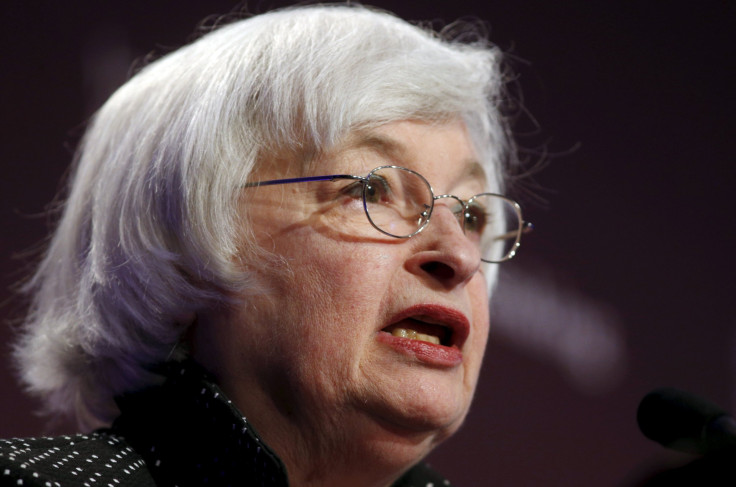Janet Yellen Speech Live Update: Federal Reserve Keeps Interest Rates Unchanged In FOMC Statement

UPDATE 3:30 p.m. EDT
Yellen’s press conference concludes.
UPDATE 3:28 p.m. EDT
The significant rise in the U.S. dollar’s value has been a drag on the economy because it reduces exports, Yellen said. The drag is likely to continue for some time, but the economy is likely to overcome that drag.
UPDATE: 3:13 p.m. EDT
"In the event that there is not agreement, I do see the potential for disruptions that could affect the European economic outlook and global financial markets," Yellen said. The U.S. has "very limited direct exposure to Greece."
UPDATE: 3 p.m. EDT
The Fed chair said it is clear that most FOMC participants anticipate a rate increase this year. "Certainly an increase this year is possible," Yellen said.
UPDATE: 2:58 p.m. EDT
"Conceivably I think with the benefit of hindsight it might have been better to raise rates more rapidly, or more, during the 2004-2006 cycle. I’m not certain of that judgment but I think there’s a case to be made," Yellen said.
The Fed committee led by Alan Greenspan from 2004 to 2006 raised interest rates 17 consecutive times.
UPDATE: 2:54 p.m. EDT
Too much attention is placed on timing of the Fed’s first hike and what should matter to market participants is the central bank’s trajectory of monetary policy, Yellen said.
UPDATE: 2:50 p.m. EDT
Yellen warned delaying action to tighten monetary policy until U.S. employment and inflation reach the central bank’s targets would risk overheating the economy. But Yellen added raising rates too early could risk derailing the economic recovery.
UPDATE: 2:46 p.m. EDT
The U.S. Federal Reserve kept interest rates unchanged Wednesday, leaving them at historic lows since the financial crisis began in 2008. Investors are now listening in on a press conference from Federal Reserve Board Chair Janet Yellen.
The head of the central bank said the committee will begin to raise rates once the Fed has seen further improvement in the labor market, but added that "wage growth remains relatively subdued…room for further improvement remains," Yellen said.
The Federal Open Market Committee was not expected to make significant changes to its post-meeting statement. But the Fed has signaled recently that it could begin returning interest rates to normal levels sometime this year, which would mark the first rate hike in nearly a decade.
“The committee anticipates that it will be appropriate to raise the target range for the federal funds rate when it has seen further improvement in the labor market and is reasonably confident that inflation will move back to its 2 percent objective over the medium term," the Federal Reserve said in its monetary policy statement Wednesday.
U.S. central bank policymakers met for a two-day meeting Tuesday and Wednesday, discussing whether tightening monetary policy too soon could damage the economy and dampen prospects for maximum employment and a targeted 2 percent inflation.
The Fed also released its updated projections for the U.S. economy over the next three years. Fed officials did revise down their projections for gross domestic product growth this year to between 1.8 percent and 2 percent, from 2.3 percent to 2.7 percent.
Along with the FOMC's summary of economic projections was the “dot plot,” which shows where each participant in the meeting expects the federal funds rate will be at the end of the year and includes data for the next few years as well.
Fed officials left their interest rate projections for this year unchanged with the median forecast at 0.63 percent, signaling the FOMC is still on course for a September liftoff.
Further ahead, the median rate projection for the end of 2016 was revised down to 1.63 percent, from 1.88 percent, while the median projection for the end of 2017 was revised down to 2.88 percent, from 3.13 percent.
© Copyright IBTimes 2025. All rights reserved.






















